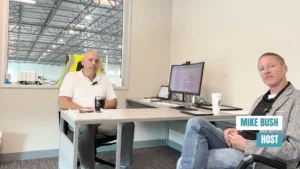Apple Eyes Battery Suppliers for Possible Electric Vehicle
According to reports from Reuters, Apple is in talks with Chinese companies BYD & CATL regarding car batteries, another indicator that the rumored “Apple Car” could be one step closer to reality. This could be big news for global electric vehicle production and competition, as well as introduce conflicting dynamics in the broader EV supply chain.
On this episode of MarketScale TV, Voice of B2B Daniel Litwin talked with Dr. Richard Kilgore, Associate Professor of Management and Business Administration at Maryville University, about Apple’s rumored car in the context of China’s EV footprint, understanding whether it’s viable to build relationships with Chinese suppliers as the country’s EV production continues to grow and its electrical components industrial sector seeks independence from US trade partnerships. Kilgore brings more than 20 years of experience as an industrial consultant to our conversation today, having worked with a wide variety of major firms, including British Aerospace and Boeing.
CATL is the world’s largest battery supplier, and any business decision from them will impact the larger EV supply chain and its competition, Kilgore explained. There’s always a chance a supplier becomes more powerful than the manufacturer themselves.
“That’s the case with electronic vehicles, we see that kind of strategic shift,” Kilgore said, “where the manufacturers are no longer the decision-makers in the industry.”
CATL already has a battery supplier relationship with Tesla, with an established presence supplying major components for US companies and their vehicles. However, CATL only supplies batteries to Tesla for cars made in China, and while Apple is reportedly pressing CATL to open a US manufacturing facility if it agrees to work with the Big Tech company, CATL has expressed concern about opening a facility on US turf.
“The more you understand negotiations between Chinese and US companies, there’s always this quid pro quo,” Kilgore said. “So to convince Tesla and Apple and any other US manufacturer of vehicles to use a CATL battery, there’s going to have to be something else in exchange for those batteries.”
Estimates by major banks HSBC and UBS show three out of five new cars sold in China will be electric by 2030, meaning the Chinese market itself, especially with its combination of public transit infrastructure, is ripe with interest in EVs. In our interview, Kilgore also offers analysis for how this market could play into an Apple EV production and launch strategy.
Follow us on social media for the latest updates in B2B!
Twitter – @MarketScale
Facebook – facebook.com/marketscale
LinkedIn – linkedin.com/company/marketscale








